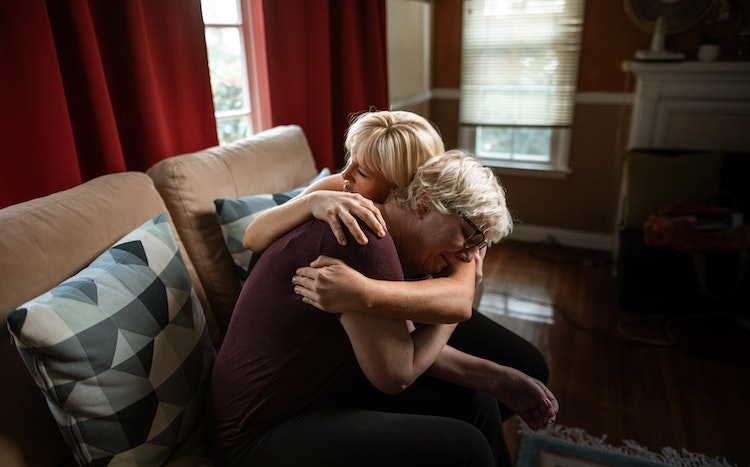 It’s not uncommon to feel guilty after surviving an addiction overdose. Whether it was a close call, or you were quickly revived with naloxone and promptly taken to the nearest emergency room, the guilt can be overwhelming—especially when you’ve lost people you cared about under similar circumstances.
It’s not uncommon to feel guilty after surviving an addiction overdose. Whether it was a close call, or you were quickly revived with naloxone and promptly taken to the nearest emergency room, the guilt can be overwhelming—especially when you’ve lost people you cared about under similar circumstances.
Survivor’s guilt can leave you doubting if you have what it takes to get sober, but we assure you that there’s always hope for a lasting recovery. Your overdose may have been a personal rock-bottom moment, but the experienced treatment team at St. Joseph Institute for Addiction’s Pennsylvania substance abuse treatment center can connect you with the resources you need to move towards a healthier and happier way of living.
What Is Survivor’s Guilt?
Survivor’s guilt is a feeling of guilt that comes after surviving something that others didn’t. It’s common after traumatic events such as drug overdoses, car accidents, natural disasters, and military combat. It can also occur after someone close to you dies.
Survivor’s guilt is different from regular guilt because it’s not based on anything you did or didn’t do. It’s a natural reaction to a traumatic event.
Signs of survivor’s guilt include:
- Feeling guilty for surviving when others didn’t
- Blaming yourself for the deaths of others
- Feeling like you don’t deserve to be alive
- Having trouble moving on after the event
Untreated survivor’s guilt can lead to depression, anxiety, and post-traumatic stress disorder (PTSD). You may experience symptoms such as:
- Flashbacks or nightmares
- Mood swings
- Lack of interest in activities you previously enjoyed
- Difficulty sleeping
- Trouble concentrating on everyday tasks
Survivor’s guilt can also increase your risk of an addiction relapse. If you’re not processing your emotions in a healthy way, you may be tempted to use drugs and alcohol to self-medicate. This can be particularly dangerous when your tolerance to previously abused substances has dropped as a result of addiction treatment. You may accidentally overdose a second time.
Treating Survivor’s Guilt
Here are some tips for how to deal with survivor’s guilt without putting your recovery at risk:
- Get professional help. Counseling and therapy can help you process your feelings and learn how to cope with them. Medication may also be helpful in treating the symptoms of depression, anxiety, or PTSD.
- Acknowledge your feelings. It’s normal to feel guilty after surviving an overdose. Give yourself permission to process your feelings at your own pace. Journaling can be particularly helpful in dealing with survivor’s guilt because your journal provides a safe and non-judgmental place to explore the different ways in which surviving your overdose has affected your life.
- Focus on the present. One of the best ways to deal with survivor’s guilt is to focus on the present. Celebrate your recovery-related milestones regardless of what challenges you encounter along the way. Be proud of yourself for working towards positive change.
- Strengthen your sober support network. Friends and family who care about your well-being and want to see you succeed can be a valuable resource for helping you to cope with survivor’s guilt from an overdose. You don’t have to go through this alone.
- Turn to your faith. If you have a religious or spiritual belief system, lean on it for support. You can pray, meditate, or read religious texts to help you cope with your guilt. Discovering the power of God’s forgiveness in recovery can be healing.
- Find a hobby. Staying busy can help take your mind off your guilt. Find a hobby or activity that you enjoy and make time for it every day. Hobbies that involve physical activity and/or time in nature can provide additional mood-boosting benefits.
- Help someone else. Once you’re established in your sobriety, helping others who are struggling with addiction can help you come to terms with your survivor’s guilt. You can become a 12-Step sponsor or informally share your story with others who may be considering addiction treatment. If you’re still building a strong foundation for recovery, random acts of kindness can provide an immediate way to experience the benefits of giving back in recovery.
We’re Committed to Helping You Build a Brighter Future
Dealing with the effects of survivor’s guilt is a crucial step in moving forward after an overdose. At St. Joseph Institute for Addiction, we provide a full continuum of care for men and women struggling with substance use disorders. Our programs are personalized to fit individual needs but focus on addressing the underlying factors that contribute to substance abuse in addition to promoting abstinence. If you’re struggling with survivor’s guilt and wondering how to best move forward after a recent overdose, contact our admissions representatives today.
Looking for addiction treatment near Altoona, PA? To learn more about SJI Pennsylvania addiction rehab, and our programs, please contact us at (814) 228-8881.


